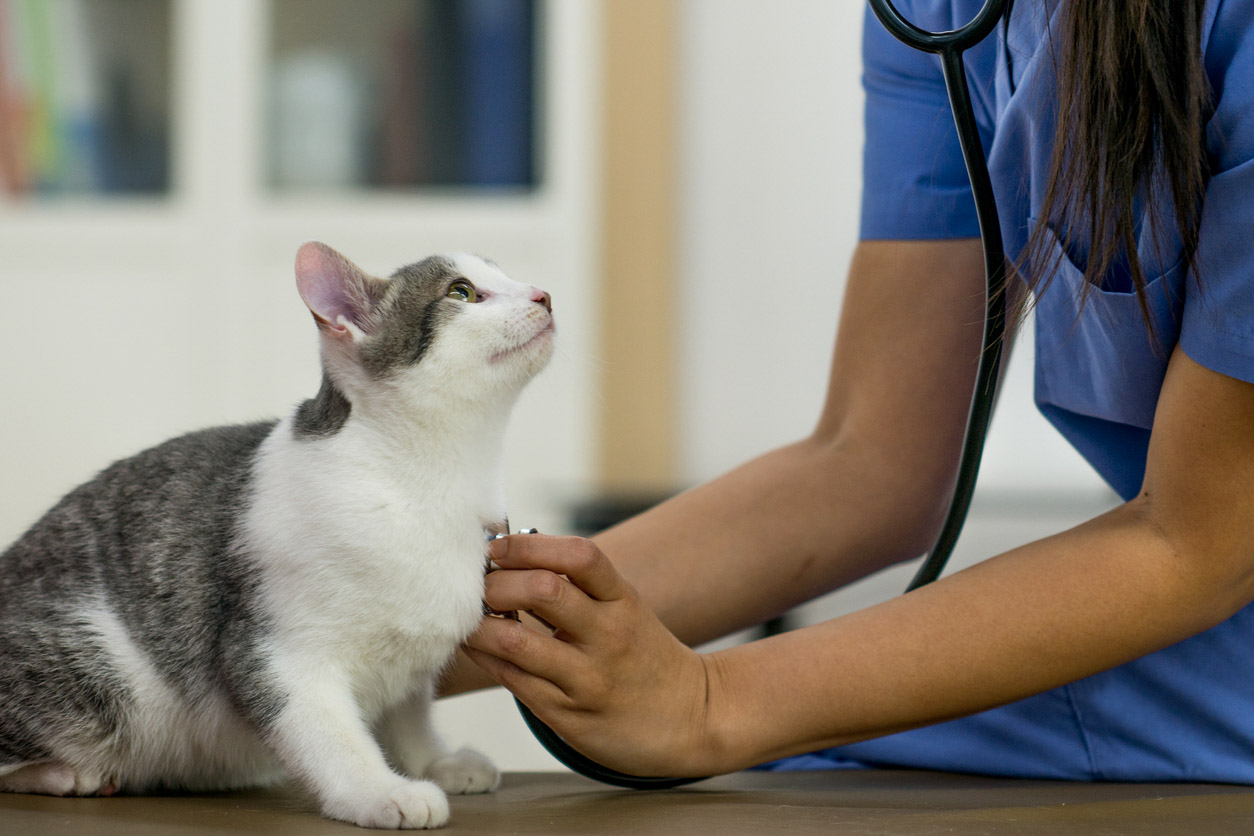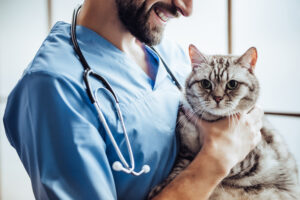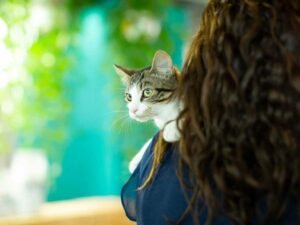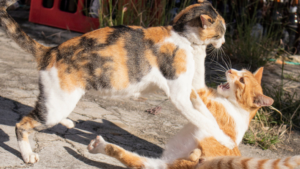What is Feline Immunodeficiency Virus (FIV)?
Feline immunodeficiency Virus or FIV, is a retrovirus. It is similar to Human Immunodeficiency Virus (HIV), but humans cannot catch Feline immunodeficiency virus. FIV causes AIDS (acquired immunodeficiency syndrome) in cats over time. It is thought that around 14 to 29% of Australian cats are infected with FIV.
FIV is found in the saliva and other bodily fluids of infected cats. Bite wounds are therefore a common source of infection, but the virus can also be transmitted sexually as well as passed on from mother to kitten via the placenta and through the milk when she nurses her kittens.
Once the virus enters the body, there can be a long period of time where the infected cat does not appear sick and therefore has an asymptomatic infection, but over time the virus affects immune function through the destruction of important immune cells. FIV is sometimes confused with FeLV, which is the Feline Leukaemia Virus.
Signs & Symptoms
Cats can be infected with FIV and not display symptoms for many years, while the virus reproduces inside the white blood cells. While some cats don’t show signs of disease, many others do. There are symptoms associated with FIV that occur in the early stages of infection, where cats may have enlarged lymph nodes, a fever, become lethargic and lose their appetites. This is usually transient, and cats may soon appear normal again. The most severe disease associated with FIV is when cats develop Feline Acquired Immunodeficiency Syndrome (feline AIDS). The signs that occur are often related to the fact that the feline patient’s immune system is no longer working properly. One of the first things that may be noticed are signs of infections, which can occur in any part of the body but can often manifest as respiratory infections, skin, eyes, urinary tract or teeth and gums. Cancers and immune mediated diseases are also not uncommon in cats with feline AIDS. Cats with ongoing weight loss, reduced appetite, gingivitis, recurrent fever of unknown origin, chronic illness, vomiting diarrhoea, recurrent eye infections, and poor coat condition should be tested for FIV.
Diagnosis
FIV is diagnosed by a blood test, which checks for antibodies in the blood. A positive FIV antibody test means that the cat has been exposed to FIV in the past, but this test isn’t definitive in ascertaining whether a cat is truly infected with FIV. A negative test result may mean that the cat has not yet developed antibodies or that their immune system is not producing antibodies due to disease. A positive FIV antibody test can also occur when a cat has had prior FIV vaccination. So, for cats who test positive for antibodies, further testing, such as PCR testing. which checks for the presence of the virus DNA. If you have more than one cat and one of them has had a positive FIV test, you should get your other cats tested. Although FIV is rarely transmitted through normal everyday living between cats, it is best to find out the FIV status of all your cats if one of them is positive for FIV.
Treatment
There is no specific treatment available for FIV infections, which means there is no cure once your cat has been infected with FIV. If your cat has signs of feline AIDs, your veterinarian will provide symptomatic treatments, which may include anti-inflammatory medications, pain relief, antibiotics, and other medications, such as those to help with gastrointestinal symptoms. FIV cats may need to be hospitalised for supportive therapy such as intravenous fluids and systemic medications if they are very unwell. There is a vaccination against FIV however, it is not completely effective, so the best way to prevent FIV is to keep cats indoors where they cannot come into contact with infected cats.
Once a cat has been diagnosed with FIV, it is important to keep them indoors, and prevent exposing them to other cats who could be infected with FIV. According to PetSure claims data from 2022, the average cost relating to FIV was $1,352, with a maximum claimed amount of $10,348*. Because FIV manifests as many other infections or diseases, the actual cost may indeed be much higher for treatments relating to underlying FIV infections.
Recovery
There is no cure for FIV, but infected cats can still live long and healthy lives with proper care and management. With supportive care and a stress-free environment, along with great nutrition and prompt attention to any other problems, infected cats can maintain a good quality of life. Regular veterinary check-ups are crucial to monitor their health and address any potential complications quickly. Additionally, providing them with a safe indoor environment helps prevent the spread of the virus to other cats. While FIV-positive cats may have weakened immune systems, with proper care and attention, they can lead fulfilling lives.
Prevention
It may be possible to reduce the risk of FIV infection by ensuring your cats are up-to-date with vaccinations. Keeping cats indoors also helps to avoid contact with other cats who may be infected. Desexing cats can also help reduce aggression and the likelihood of getting into fights.
Frequently Asked Questions
FIV, is a viral infection that affects cats. It weakens their immune system and makes them more susceptible to various infections and diseases
FIV is mainly transmitted through deep bite wounds during aggressive fights between cats. It can also be passed from an infected mother cat to her kittens, either during birth or through nursing. FIV is not easily transmitted through casual contact, such as sharing food bowls or grooming.
Cats infected with FIV may not show any symptoms initially. However, over time, they may develop signs such as weight loss, poor appetite, recurring infections, dental problems, lethargy and changes in behaviour or mood.
Currently, there is no cure for FIV. Once cats are infected, they remain infected for life. However, with proper care, management, and veterinary support, infected cats can live long and healthy lives.
The best way to protect your cat from FIV is to prevent exposure. Keep your cat indoors to minimise contact with potentially infected cats. Desexing your cat can also reduce the chances of them getting into fights. Additionally, consider FIV vaccinations if your cat is at high risk.
It is generally recommended to keep FIV-positive cats separated from FIV-negative cats to prevent transmission. If you do wish to introduce your FIV – positive cat to an FIV negative cat, consult with your veterinarian for guidance.
No, FIV is a feline-specific virus and cannot be transmitted to humans or other non-feline animals.
According to PetSure claims data from 2022, the average cost relating to FIV was $1,352, with a maximum claimed amount of $10,348*. Because FIV manifests as many other infections or diseases, the actual cost may indeed be much higher for treatments relating to underlying FIV infections.
Cat flu is generally covered by comprehensive accidental injury and illness pet insurance policies administered by PetSure (check our brand partners at petsure.com.au/partners), unless related to a pre-existing condition or exclusion. Please refer to your policy documents and Product Disclosure Statement (PDS) for more information.
Preventative and routine care (non-insurance benefit) items such as vaccinations, whether recommended by your veterinarian or not, are not covered by PetSure policies. Please refer to your policy documents and Product Disclosure Statement (PDS) for more information.
*Reimbursement for these claims would be subject to limits, such as annual benefit limits or sub-limits, benefit percentage, applicable waiting periods and any applicable excess. Cover is subject to the policy terms and conditions. You should consider the relevant Product Disclosure Statement or policy wording available from the relevant provider. Treatment relates to Heartworm and all medically related conditions in that policy period.
Please note that the values calculated are based on all claims for that condition and medically related conditions in each calendar year.
Insurance products are issued by The Hollard Insurance Company Pty Ltd ABN 78 090 584 473, AFSL 241436 (Hollard) and/or PetSure (Australia) Pty Ltd ABN 95 075 949 923, AFSL 420183 (PetSure) (from 8 May 2023 only), administered by PetSure and promoted and distributed through their authorised representatives and distribution partners.
Any advice provided is general only and does not take into account your individual objectives, financial situation or needs. Cover is subject to the policy terms and conditions. Please consider the Product Disclosure Statement (PDS) to ensure this product meets your needs before purchasing, or choosing to continue with the product. PDS and Target Market Determination available on our partners’ websites. Meet our partners at petsure.com.au/partners.
References
The protective rate of the feline immunodeficiency virus vaccine: An Australian field study
Pet insurance can help by covering a portion of the eligible vet bill if the unexpected happens. Because it is difficult to predict the costs of veterinary care, it can help to have measures in place to help prepare for the unexpected. Check out our partner network and explore our policy tools to find a pet insurance policy.
Not all conditions or items are covered by Pet Insurance. Refer to the applicable Product Disclosure Statement for information about coverage and exclusions.



 Fact checked
Fact checked





